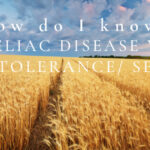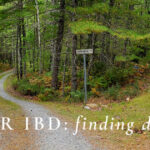GETTING YOUR POOP TOGETHER
It’s time to get real. When was the last time

DIVERTICULOSIS OR DIVERTICULITIS? The terms diverticulosis and diverticulitis sound similar, but what’s the difference? And is one more serious than the other? These are common questions I get when discussing the topic of diverticulosis and diverticulitis, so, let’s discuss. They are different, but related. The short version: Diverticulosis is an out-pouching of the wall of the intestine, and diverticulitis refers to the process of one or more of these pouches becoming infected and inflamed. So, what exactly is diverticulosis (the longer version)? Diverticulosis
IS IT OK TO GOOGLE MY SYMPTOMS? Chances are, if you’ve been handed off from doctor to doctor, without finding a resolution for your gastroenterological issues, you may be at the end of your patience with standard medical practices. After all, you are an individual person with individual symptoms – not just someone who can be placed in a box and given a one-size-fits-all solution. Have you Googled your symptoms looking for answers? Trust me, you are not alone! Everyone does it. As
UNDERSTANDING THE DIFFERENCE BETWEEN CELIAC DISEASE & WHEAT INTOLERANCE / SENSITIVITY People often ask me what the difference is between celiac disease and gluten or wheat intolerance/sensitivity. It is a good question, and can be confusing, so I would like to give some basic information regarding the difference. Of course, if this is something you are struggling with and need support, please make an appointment to see me, and we can discuss what might be appropriate for your particular situation. Celiac disease
SHOULD YOU TRY A RESTRICTIVE DIET? Are you sensitive to certain foods and wonder if eliminating foods from your diet might help? A restrictive diet can certainly help reduce symptoms sometimes, but they can also have unintended consequences such as nutrient deficiencies and disordered eating. As such, restrictive diets should be used judiciously and ideally on a short-term basis. This month I’m breaking down restrictive diets and helping you determine when and if it is something to explore. If you are considering
/ HYDRATION AND ELECTROLYTE REPLACEMENT Admittedly, I was thinking about this blog topic after our late May heat wave, when I thought we might escape “Juneuary” here in Seattle, but alas, our weather can be very unpredictable. That said, it’s definitely bound to heat up after July 4th (at least we can count on that!) With that in mind, it’s time to talk about hydration and electrolyte replacement. I don’t often write about general health in my blogs, as a naturopathic doctor
WHEN A THERAPEUTIC DIET MIGHT BE NECESSARY Therapeutic diets have been used for decades to manage various health conditions, especially gastrointestinal (GI) disorders. Although therapeutic diets can be beneficial for many patients, they must be used judiciously to avoid the risk of disordered eating, particularly in children. As a naturopathic doctor specializing in gastroenterology, I recognize the importance of using therapeutic diets for short periods of time to reduce symptoms and then gradually expanding the diet as symptoms improve. One important
FIVE THINGS TO KNOW ABOUT IBD Inflammatory bowel disease (IBD) is a chronic condition that affects the gastrointestinal (GI) tract. Here are five important things you should know about IBD: IBD affects millions of people worldwide: IBD is a global health issue, with an estimated 3 million people affected in the United States alone. The condition is found in people of all ages, although it is most commonly diagnosed in young adults between the ages of 15 and 35. (SOURCE) There are two
Many people seek the help of a naturopathic doctor with a specialty in gastroenterology after being diagnosed with IBS by their Gastroenterologist. Tired of merely managing IBS symptoms, patients want to get to the bottom of their diagnosis, and find that GI doctors are limited in the care they are able to give. Naturopathic medicine offers solutions beyond a chronic diagnosis and helps alleviate and/ or eliminate the underlying causes of an illness. The diagnostic criteria for Irritable

9057 Greenwood Ave N Ste C205 Seattle, Washington 98103
206-643-2239
206-299-4361
staff@pnwintegrativemed.com

It’s time to get real. When was the last time

Have you noticed a burning sensation in your esophagus or

UNDERSTANDING THE DIFFERENCE BETWEEN CELIAC DISEASE & WHEAT INTOLERANCE /

As a naturopathic doctor with a specialty in gastroenterology I

For those who have chronic bowel discomfort and have not
Tuesday 10:00 AM - 5:00 PM
Wednesday 10:00 AM - 5:00 PM
Thursday 10:00 AM - 5:00 PM
Monday 8:00 AM - 4:00 PM
Tuesday 8:00 AM - 4:00 PM
Wednesday 8:00 AM - 4:00 PM
Thursday 8:00 AM - 4:00 PM
Friday 8:00 AM - 4:00 PM
Designed by AMOR © 2024 All Rights Reserved